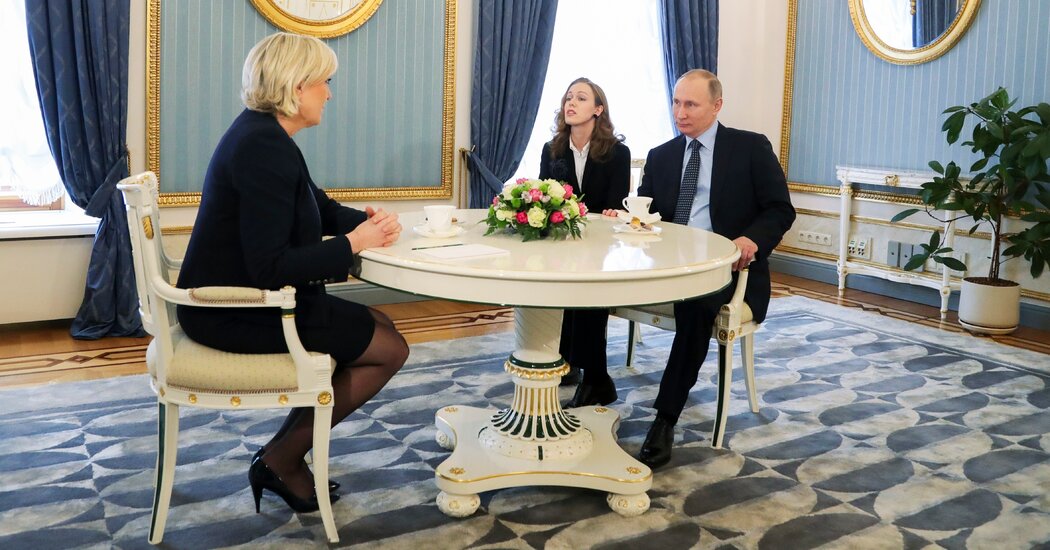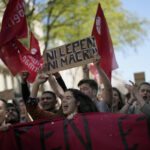
PARIS — When Europe’s far-right leaders gathered in Madrid in January, they had no problem finding unity on the issues they hold dear, whether cracking down on immigrants or upholding “European Christian ideals.” But as Russian troops massed on the Ukrainian border, they were divided on one issue: the threat posed by President Vladimir V. Putin.
Marine Le Pen, the extreme-right challenger for the French presidency, objected to a paragraph in the final statement calling for European solidarity to confront “Russian military actions on the eastern border of Europe.” Even in a gathering of illiberal nationalists, she was an outlier in her fealty to Mr. Putin.
Now, on her campaign website, the leaders’ statement appears with that paragraph cut in an unacknowledged change to the text. This little subterfuge is consistent with an embrace of Mr. Putin so complete that even his ravaging of Ukraine has hardly diminished it.
Over the past decade, Ms. Le Pen’s party, the National Rally, formerly the National Front, has borrowed millions from a Russian bank, and Ms. Le Pen has supported Mr. Putin’s annexation of Crimea in 2014, as well as his incendiary meddling that year in the Donbas region of eastern Ukraine, where just this week Russia redoubled its offensive.
Her support for Mr. Putin is one thing in a time of peace and another in a time of war. Russia, a nuclear power, has invaded a European state, and Ms. Le Pen is closer than ever to her cherished goal of becoming president of France, having narrowed the gap with President Emmanuel Macron before the decisive round of the election on Sunday.
With polls showing Ms. Le Pen gaining about 44.5 percent of the vote to Mr. Macron’s 55.5 percent, she is within range of the shocks that produced Brexit and Donald J. Trump’s victory in 2016. As in Britain and the United States, alienation and economic hardship have fed a French readiness to gamble on nationalist dreams.
If Ms. Le Pen wins, which is not likely but possible, her victory will almost certainly fracture the allied unity engineered by President Biden in an attempt to defeat Mr. Putin. It would hand Mr. Putin by far his most important ally in Europe, one he could leverage in his aims to divide Europe from the United States and fracture Europe’s decades-old project of unity.
France, a core member of the European Union and NATO, is suddenly the possible soft underbelly of the West.
Julien Nocetti, a Russia expert at the French Institute of International Relations, said there was “a complete ideological alignment between Putin and Le Pen” — one that would be deeply worrying to France’s American and European allies.
The Ukraine war has caused Ms. Le Pen to pivot a little by saying Mr. Putin crossed “a red line” with the invasion, but she still says her foreign-policy priority is a rapprochement with Russia once the fighting stops.
Since Ms. Le Pen, 53, took over the leadership of her party in 2011, she has only deepened its Putin predilection, making four trips to Moscow and one to Crimea. She would support sanctions against Russia, she says, but not cutting off imports of Russian oil and gas, which she has equated with economic death for France.
“We have to think of our people,” she said in a recent TV interview, a position consistent with the strong focus on pocketbook issues that has propelled her campaign. The majority of French people are more focused on getting to the end of the month than getting Russia out of Ukraine.
Certainly, Ms. Le Pen vaunted her connection with Mr. Putin until he went to war on Feb. 24. She included a photo of herself shaking hands with him in her election brochure as evidence of her “international stature.” This handout disappeared abruptly from view after the Russian invasion.
The photo was taken at the Kremlin on March 24, 2017. That was less than five weeks before the first round of the last presidential election, in which Mr. Macron defeated Ms. Le Pen by 66.1 percent to 33.9 percent. The National Rally leader said then that she would immediately review lifting “unjust” sanctions against Russia if elected.
As for Mr. Putin, he said with a knowing smirk that Russia did “not want to influence events in any way.”
Jean-Maurice Ripert, the French ambassador in Moscow from 2013 to 2017, said in an interview that a fellow European ambassador, a close friend, had asked the Russian leader after the French election why he had backed Ms. Le Pen.
“Because I had been told she was going to win,” Mr. Putin said.
Certainly that is what he wanted. Ms. Le Pen, committed to “equidistance” between great powers and hostile to “America’s protectorate on European soil,” sees in Mr. Putin the defender of the nation-state, family and Christianity against border-eroding multilateralism and irreligious cultural decay.
“It’s all about sovereignty,” said Marlène Laruelle, the French director of the Institute for European, Russian and Eurasian studies at George Washington University. “The sovereign state against international organizations; the sovereign traditional family against L.G.B.T.Q. rights.”
Then there is the money. Unable to get a loan from French banks, Ms. Le Pen and several of her top aides scrambled for cash in Russia, accepting a 9.4 million euro loan, then $12.2 million, at a 6 percent interest rate, from the First Czech-Russian Bank in September 2014. It was supposed to be repaid by 2019.
Wallerand de Saint-Just, who was long the National Rally’s treasurer before leaving the position last year, negotiated the deal in Moscow. In a written answer to a question as to why French banks had refused any loan to the National Rally, he said “My experience with the six big French banking groups is that they obey orders from the political executive.”
But given the lack of transparency and accountability in Russia’s financial sector — and Mr. Putin’s sway over it in his pay-to-play system — the sum has long raised hard questions of just how beholden Ms. Le Pen actually is to the Russian president, and whether some of her outspoken backing for him has been a consequence.
I asked Ms. Le Pen this month at a news conference whether the outstanding loan did not create at least the impression of dependence on Russia, a liability for any future president?
“Absolutely not,” she said. “I am totally independent of any link to any power.”
In her current campaign, again unable to get a loan from a French bank, Ms. Le Pen turned to Hungary, where Viktor Orban, the anti-immigrant Hungarian prime minister, has been in power for 12 years. A Hungarian bank has now lent the National Rally another $11.4 million, so if she were to win she would be indebted to both Mr. Putin and Mr. Orban.
Already her backing of Mr. Putin has been borderline fawning. Ms. Le Pen visited Moscow and Crimea in June 2013; Moscow in April 2014; and Moscow again in May 2015. She was received by the president of the Duma, the lower chamber of Russia’s Parliament, during the first of these visits, and sprinkled her Russian sojourns with pro-Putin remarks.
In 2013, she blamed the European Union for a new “Cold War on Russia.” In 2015, also while in Moscow, she criticized France’s pro-American stance and suggested this would change “in 2017 with Marine Le Pen as president.” In 2021, she recommended Russia’s uncertain Sputnik vaccine for the coronavirus, saying “our anti-Russian ideology should not ruin our capacity to vaccinate our fellow citizens.”
The 2014 visit came at a particularly delicate moment, given the Crimea annexation. It was one of several demonstrations of support for Mr. Putin from prominent members of Ms. Le Pen’s party who visited Crimea that year, and the Donbas, the Ukrainian region where clashes kindled by Moscow had begun.
Among them was Aymeric Chauprade, her former top diplomatic adviser, who went to Crimea to observe the dubious March 2014 referendum that massively backed the Russian annexation. A United Nations General Assembly resolution declared the vote invalid.
“It was the West that began changing European borders with Kosovo’s independence in 2008,” Mr. Chauprade, who has since left the National Rally, said in an interview. “There was an openness to accepting invitations from Russia, a good atmosphere.”
Mediapart, a French investigative news website, was the first to expose the Russian loan to the National Rally in September 2014. In an earlier interview with Mediapart, Mr. Chauprade said visits to the Donbas that year and in 2015 by Jean-Luc Schaffhauser, a former National Rally member of the European Parliament, had been a “quid pro quo” for the loan.
What to Know About France’s Presidential Election
“Going to the Donbas amounted to strong support for Russia,” he said.
Mr. Schaffhauser did not respond to a request for comment.
I asked Mr. Chauprade whether the loan was indeed a “quid pro quo.” He said that while there was an “inclination to help,” there was “no conditionality.”
The Russian loan, whatever the strings, has had a convoluted history.
Shortly after the First Czech-Russian bank collapsed in 2016, the National Rally loan was acquired by Aviazapchast, a private Russian company that in Soviet times was part of the aviation ministry, supporting Soviet aircraft operating abroad.
On its website, Aviazapchast describes its main activities as “supply of aviation technical equipment and civil and dual-use material as well as repair of aircraft.”
Its general director is listed as Dzheruk V. Ivanovic, who served in the Russian armed forces from 1983 to 1996. A former deputy general director, Yevgeny N. Barmyantsev, worked as a Soviet spy in the United States, before he was expelled in 1983.
A New York Times account at the time said he was “caught in the act of retrieving what he thought were stolen American military secrets from the base of a tree in rural Maryland.”
Odd company, on the face of it, for a French presidential candidate’s party to keep.
Mr. Saint-Just, in his written answer, said that Aviazapchast’s “holding of the loan has been entirely approved by the court of appeal in Moscow.”
“This is a very obvious and clear case of dependence on Russia,” Mr. Nocetti, the Russia expert, said. “The company holding the loan has an organic link with the Russian government through its military origins.”
Mr. Macron, in an electoral debate on Wednesday with Ms. Le Pen, said, “When you speak to Russia, you speak to your banker.” She insisted that she was “a totally free woman.”
Ms. Le Pen, in answer to my question, said she was ready for any French or American bank to take over the loan. “We continue to reimburse the loan. That is the only obligation of my movement,” she said.
It is possible that the exercise of power, if she is elected, would attenuate Ms. Le Pen’s long-held pro-Putin, anti-NATO positions, especially if Mr. Putin prosecutes the war in Ukraine with relentless brutality.
Last week, however, she said that she would withdraw France from the integrated military command of NATO, a technical step with powerful symbolism at a moment when NATO’s original mission to defend a free Europe against Moscow has been revived.
America’s alliance with France, one of its oldest, has been put to many tests over the centuries. But all the evidence suggests that a France governed by Ms. Le Pen would pose enormous problems for President Biden just when he needs his nuclear-armed ally most.
One core issue is how free Ms. Le Pen would really be when it comes to Russia. “If Ms. Le Pen is still reimbursing, she is not free, she’s dependent,” said Sylvie Bermann, who succeeded Mr. Ripert as French ambassador to Russia in 2017.
Mr. Saint-Just, the former National Rally treasurer, had another explanation of Ms. Le Pen’s Russia policy. “She believes in balance and equidistance. She has always had in her head a phrase of General de Gaulle: ‘In foreign affairs, France has no friends, only interests.’ ”
Adèle Cordonnier contributed reporting.




